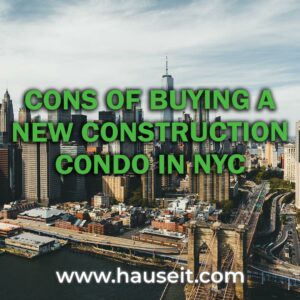Key disadvantages of buying a new construction condo in NYC include higher closing costs, year two increases in property taxes, post-closing restrictions on renting or selling and the possibility that building amenities and common areas may not be completed by the time you close.
These key disadvantages represent the tip of the iceberg in terms of the special risks associated with buying a new construction condo in NYC.
Click on the sections below to learn more.
Cons of Buying a New Construction Condo in NYC:
Buyer Closing Costs Are Higher for New Construction Condos in NYC
Buyer closing costs for new development condos in NYC are up to 6% compared to 3% to 4% for traditional resale apartments.
Additional buyer closing costs which are only applicable to new developments include NYC Transfer Tax (1% to 1.425%), NYS Transfer Tax (0.4% to 0.65%), sponsor attorney and document fees, building working capital contribution as well as a super apartment (residential manager unit) contribution in the case of larger buildings.
Keep in mind that these additional ‘sponsor’ closing costs are often negotiable. Whether or not a developer is willing to cover some or all sponsor closing costs depends on how motivated the developer is.
If a building is meeting its sales targets with ease, odds are quite low that the developer will negotiate sponsor closing costs.
Conversely, a developer is highly likely to negotiate closing costs if a new development finishes construction and has loads of unsold units.
A particularly motivated developer may even be willing to cover some non-sponsor closing costs, such as the Mansion Tax, and possibly throw in other freebies such as a storage cage.
A Full Service Listing for 1%
Sell your home with a traditional full service listing for just one percent commission.
The first year real estate tax figure is actually an average of the taxes on the in construction and finished values. Since the taxable value of a finished building is higher than a partially constructed building (or vacant land), your real estate taxes will eventually be higher than what’s listed in the offering plan.






